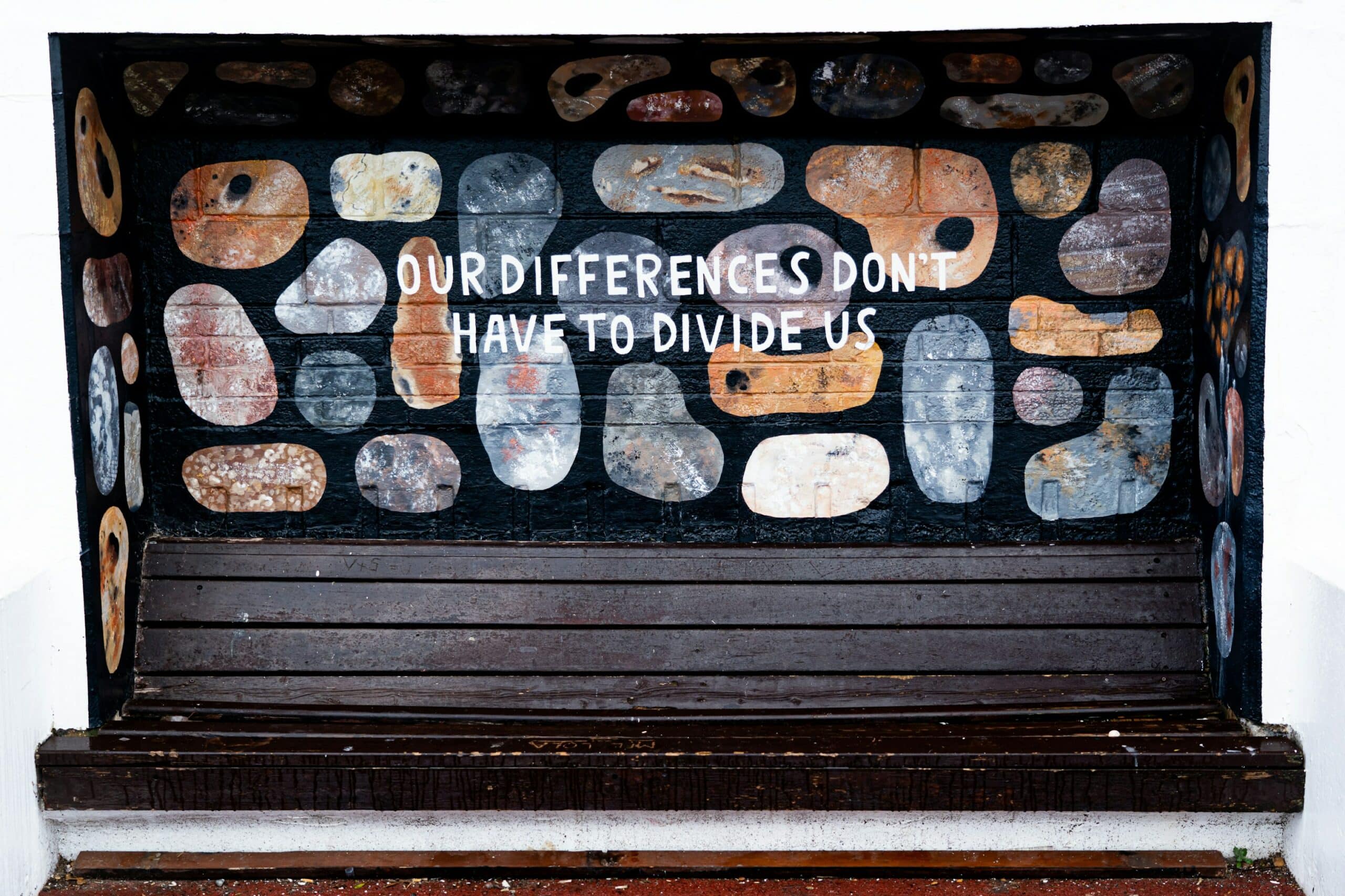Entrusted with reconciliation: living the message we carry
Posted by Difference on June 2, 2025
Reconciliation
Shermara Fletcher-Hoyte, Principal Officer at Churches Together in England, invites us to take the first brave steps toward reconciliation in our divided world.
Why choose reconciliation when division feels so much easier?
We live in a world that rewards separation. We’re encouraged to retreat into echo chambers, curating spaces where everyone looks, votes, and even worships like us. At the tap of a screen, we can mute those who challenge our worldview, justifying our silence with outrage, distraction, or even fatigue. The temptation to disengage is real. And yet, the gospel won’t let us off the hook.
Our world is groaning. Conflict rages in Israel and Gaza, in Ukraine and Russia, and in countless other corners of the globe. Human bodies are trafficked across borders, exploited through forced labour and sexual violence. Children go to bed hungry while economic systems prioritise profit over people. All of this cries out for a deeper kind of healing, one that doesn’t just smooth over cracks but restores what’s been shattered. We need reconciliation. Not the shallow kind, but the kind that is rooted in justice, truth, and love. The kind that sees every person as made in the image of God and refuses to accept systems that dehumanise, divide, and exploit.
This is why reconciliation cannot be treated as a lifestyle preference. It is a divine calling. As Paul reminds the church in Corinth: “All this is from God, who reconciled us to himself through Christ, and has given us the ministry of reconciliation; that is, in Christ God was reconciling the world to himself, not counting their trespasses against them, and entrusting the message of reconciliation to us.” (2 Corinthians 5:18-19)
This isn’t a polite suggestion. It’s a sacred trust. And if reconciliation is the message we’ve been given, then we must become the living embodiment of that message; we have to live it. That means choosing relationships over retaliation, listening when we’d rather shout, and loving not only our neighbours, but sometimes our adversaries. This also does not mean that we enable toxic characteristics or behaviour, but that love should fuel correction and accountability.
The gospel of first moves
Romans 5:10 makes it plain that “while we were enemies, we were reconciled to God through the death of his Son.”
Let that sink in. God made the first move, not when we were perfect, not when we were apologetic, but while we were enemies. That’s the kind of kingdom we belong to. One that reconciles not only across difference, but across enmity.
So what does that mean for us today? What might it look like to reconcile with a political adversary? To sit at the table with someone whose policies harm the people you love? To extend relationships toward those who uphold structures that suffocate entire communities? It feels impossible, right? And let’s be honest: for Christians, it is without Christ. But this is the scandal and the glory of the gospel: God reconciles the irreconcilable. And then entrusts us with that same work.
I remember a powerful moment during one of our community projects that was intentionally designed to bring together people from different walks of life. Around that table sat an investment banker, a multi-millionaire, individuals who were homeless or vulnerably housed, along with Christians, Muslims, agnostics, and those who wouldn’t associate with any faith at all.
By all accounts, there were more than enough reasons for people at that table to remain divided or even to despise one another. Those struggling to make ends meet could have resented the visible wealth in the room. The wealthy could have looked with disdain on others who, despite their hardship, had the time to be present with their families while they remained burdened by the relentless pressures of success and stakeholder expectations. And the banker could easily have been written off as a symbol of a system that puts profit above people.
But in that moment, all the social constructs and assumptions came to a halt: they broke bread together. They shared stories. They laughed. They listened. The table became a place of fellowship where labels dissolved and their raw, honest and unfiltered humanity emerged. It was a glimpse of the kind of community we long for, one where dignity is not determined by status, where difference does not divide, and where we see each other not as categories, but as people.
We see another example of engaging with uncomfortable difference in John 4. Jesus, a Jewish man, initiates a conversation with a Samaritan woman who is an ethnic, religious, and gendered outsider. She’s not only a Samaritan (a people scorned by Jews), but an outcast in her own community. She draws water at noon, in the heat of the day, alone, yet Jesus meets her there. He breaks the rules of religious hierarchy, crosses boundaries of gender and ethnicity, and refuses to see her through the lens of cultural suspicion. Instead, he sees her humanity and he offers her living water.
This is what reconciliation looks like. Not ignoring difference but stepping into it on purpose and with love.
Ecumenism as reconciliation in action
This is the work I’ve committed my life to. I was appointed as a national principal officer of Churches Together England at 27 in the aftermath of George Floyd’s murder. I was plunged into the deep waters of ecumenical work, which is commissioned to bring together churches that sometimes have complex relationships, despite claiming the same Lord.
It taught me something simple but profound: ecumenism is not just theological collaboration, it’s gospel-shaped reconciliation. It’s messy and it’s hard, yet it’s absolutely necessary. Because if we can’t model reconciliation in the Church, how will the world believe it’s possible anywhere?
What if this is our message for today? What if, in a world addicted to division, this is the very message God is entrusting to us? Not a message of tolerance, but of radical, kingdom-shaped love. Not surface-level peace, but hard-won justice. Not proximity without transformation, but real, mutual, costly reconciliation.
What if we stopped waiting for the “other side” to move first? What if we became the first-move makers? Because Christ was the first-move maker toward us.
This is the scandal of grace. This is the power of the gospel.
This is the sacrifice and fruit of reconciliation.
This is the message he has trusted us to carry.
Let’s live it.

Shermara Fletcher-Hoyte is the Principal Officer at Churches Together in England (CTE) leading their work in areas of Pentecostal, Charismatic, and multi-cultural relations. CTE encourages churches from a wide range of traditions to work together in unity and Shemara has responsibility for racial justice and young adult ecumenical engagement.
Shermara is a dedicated minister, speaker, and writer – contributing to works such as Young, Woke, and Christian; Coming Home: Christian Perspectives on Housing; Black, Christian, and Single; Anglicans and Pentecostals in Dialogue; and Lived Mission in 21st Century Britain.



